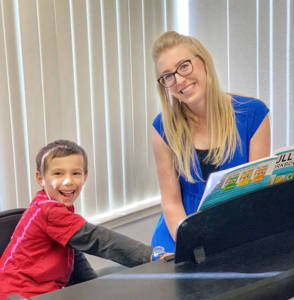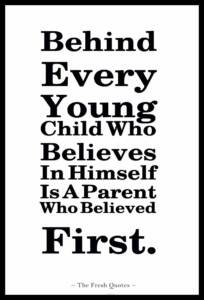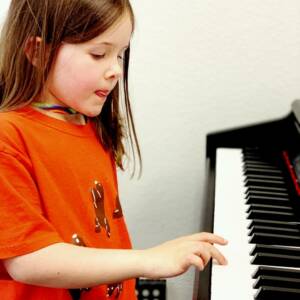How young can kids start piano lessons?
Kids can start piano lessons really at any age! We get this question all the time. Our answer? It depends. It depends on what? Well, it depends on a number of factors. There isn’t a magic age for children to start piano lessons. In this blog we wanted to cover a few main aspects that contribute to the success or failure of a child’s piano experience.
1. It Depends on Child
Every child is unique and every child’s development will progress at their own rate. We’re not going to dive into child development in this article, but we do want to point out that there are so many factors to a child’s early development as a person. There are factors of their own personality and factors of their home environment. There are factors of their health and factors of their social environment. So many things shape a young child’s unique development that this point alone would suffice to explain our answer of it depends.
2. It Depends on the Teacher

Every teacher is also unique. The combination of personalities between student and teacher is also a big factor that plays into
the success of a young child’s experience with their piano lessons. Just like adults who get along better with certain people than others, children have similar experiences with their teachers.
It is important to find a private instructor that your child enjoys being with. This positive connection will feed into the level of commitment a young child will choose to put in themselves. If a child has the desire to please their teacher, there will be more of a chance that they will be open to receiving their teacher’s instruction.
Of course, just like in all relationships, there will be good seasons and not so good season between a teacher and student. But what is important to see is that a teacher can identify these interpersonal issues and apply different approaches to maneuver the relationship past that season.
Not every piano teacher has strong interpersonal or emotionally intelligent skills. If you can find a piano teacher who is not only a great teacher but also a good people-person, your child will have a better chance for success when they start piano lessons.
3. It Depends on the Parents
A parent’s personal involvement also plays a big role in a very young student’s success with their piano lessons. A parent who is serious about their child receiving the best experience from their lessons should be involved both as emotional support and as the disciplinarian.
It is the parent(s) who carries on the piano experience through the week, between each weekly lesson.
What does it mean for a parent to be an emotional support for their young student? It means that a parent is actively present for all the emotions that children experience when taking piano lessons. Emotions like frustration with difficult technical concepts or lack of patience to put in the practice time when they don’t feel like it. Children need help in processing their emotions and learning how to mature in dealing with them. Giving encouragement and praise is also part of being an emotional support. Children like to please and they thrive when they know that what they are working on is appreciated and liked. As a parent, simply give compliments or just sit and listen to your child play piano or practice their piano lessons materials and you will find your child feeling more successful and hopefully loved and inspired.
How Much is a Parent Involved as a Disciplinarian?
What does it mean for a parent to be the disciplinarian around a young student’s piano lesson experience? A piano teacher who sees your child once a week for a 30min lesson can’t be the one to develop routine with a child. When it comes to time put into practice, that is where a parent does better than a teacher. Teachers can give guidelines for daily routine, but it’s the parent who lives the day to day with their child. It’s the parent who must cultivate and instill the discipline of routine with a child. 
Too often we see parents absent in their young child’s piano experience. For example, we see parents who don’t enforce any practice at home. These same parents become discouraged when their child doesn’t want to take piano lessons anymore. We can never stress enough how much parental involvement plays a huge role in the musical success of the student.
4. It Depends on Other Outside Input
Outside input isn’t nearly as much under your control as the previous points but it is important to make this point as well. Outside positive input would be input from friends, family or neighbors who come around. Simple phrases like, “Wow, you started piano lessons? How exciting!” or “Wow, you are getting better and better on the piano every time I hear you play. I love it!”.
Any outside positive input helps to reinforce the overall positive experience a very young child has with starting piano lessons and maintaining momentum. Sometimes children need confirmation from the outside world on the things that they hear from their positive reinforcement at home.
To Conclude…
 Oftentimes our answer to how young can kids can start piano lessons is the shorter summary to all that we have shared: “Well, it depends on the child’s attention span and how much you, the parent, plan to be involved.”
Oftentimes our answer to how young can kids can start piano lessons is the shorter summary to all that we have shared: “Well, it depends on the child’s attention span and how much you, the parent, plan to be involved.”
The best place to start is to just try the piano lessons out. Get a feel for the student, the teacher, and their dynamics together. It might take some planning-as-you-go to figure out what works best for the student. No one can put together a perfect plan ahead of time.
So our encouragement to parents is: be involved, be patient, be open and be knowledgeable! The younger your little piano student is, the more of these you should be. Watch your little one take it further than she would have without you! As they say, “Behind every young child who believes in himself is a parent who believed first.” and we believe that too! We believe in you!
